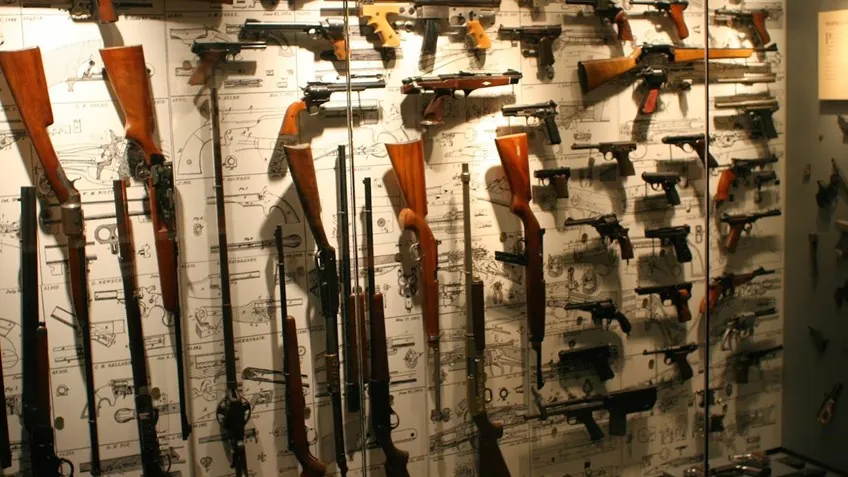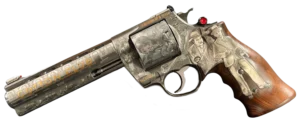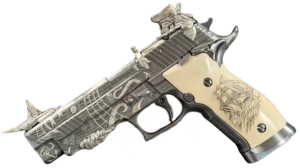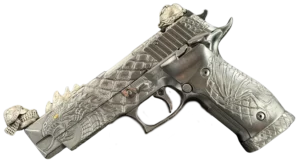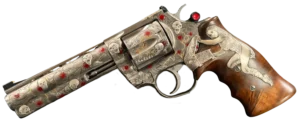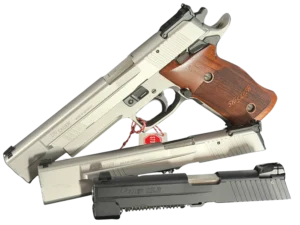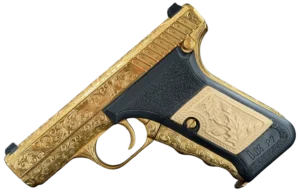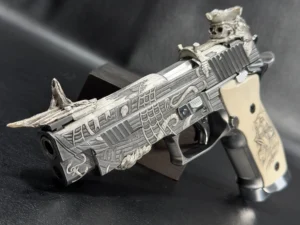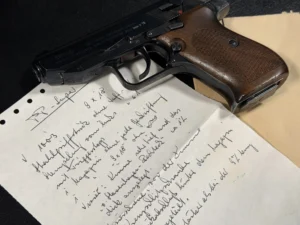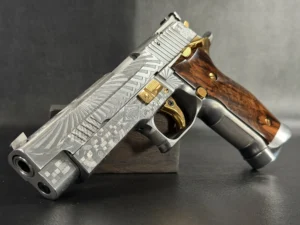- A gun collection is a story collection in disguise: It’s not about hoarding metal — it’s about the hands that held it, the eras it lived through, and the weird, winding path each piece took to end up in yours. The best collections don’t just show off — they speak.
- There’s no “right” way to collect — only your way: Whether you’re a timeline guy, a specialist nerd, or just someone who buys what gives them goosebumps, that’s all fair game. The only rule? Be curious, be honest, and know when to walk away from a bad deal.
- Maintenance isn’t sexy, but it’s essential: Cleaning, storing, checking for rust — yeah, it’s tedious. But it’s also what separates a lasting collection from a pile of forgotten steel. Respect the gun, and it’ll hold its value — and its story — for decades to come.
Let’s be honest: gun collecting isn’t just about owning a bunch of firearms. It’s about the stories they carry. The scratches on the stock, the patina on an old barrel, the proof marks stamped by long-defunct factories — they all whisper something from the past. And for those of us who listen closely, it’s a kind of magic.
Whether you’ve been chasing down rare pieces for decades or you’re just dipping your toes in and wondering if that beat-up revolver your uncle gave you is worth anything, this guide’s for you. No fluff. No polished sales pitch. Just a real conversation about what it means to collect guns — the history, the thrill, the maintenance headaches, and everything in between.
So… Why Do People Collect Guns Anyway?
Ask five collectors and you’ll probably get seven answers. The pure mechanics draws in some — the click of a bolt, the elegance of a design that hasn’t changed in a hundred years. Others are in it for the history. A Civil War rifle isn’t just wood and steel — it’s a time machine.
And then there’s the thrill of the hunt. That “holy grail” piece you’ve been searching for at shows and online auctions for years? Finding it is like hitting the lottery… without the annoying taxes.
And, yes, let’s not pretend that value doesn’t play a role. Certain guns are appreciated like fine art. A well-curated collection isn’t just a passion project — it can also be a surprisingly solid investment if you know what you’re doing.
What Every Collection Needs (Eventually)
No two collections look the same, and that’s part of the fun. But there are some firearms so iconic, so dripping with history or mechanical genius, they’re practically must-haves — or at least worthy of a spot on your wishlist.
The M1911: A Love Letter in Steel
This one needs no introduction. The M1911 has served through two world wars, countless conflicts, and won’t die. It’s not just reliable — it feels right in your hand. Some folks chase early Colt models. Others hunt down wartime variants with obscure inspector marks. Either way, the 1911 isn’t just a gun — it’s a legend.
Old West Revolvers: Guns That Wrote American Myth
There’s something romantic (and a little dangerous) about holding a Colt Single Action Army. Maybe it’s Hollywood’s fault. Perhaps it’s just the sheer audacity of those early frontier days. But guns like the Colt Dragoon and Smith & Wesson Schofield are soaked in grit and lore. They’re not just pieces of history — they feel like characters themselves.
Winchester Lever Actions: The Original Do-It-All Rifle
Models like the 1866 and 1873 weren’t just popular — they were everywhere. Farmers, lawmen, ranchers, outlaws… everyone carried a Winchester. The craftsmanship, the balance, the stories attached to each one — it’s no wonder these rifles are considered crown jewels in many collections.
WWII Guns: Relics From a Global Turning Point
M1 Garands, 1903 Springfields, Johnson Model 1941s — these guns were there when history shifted. Even more coveted? Bring-backs. Enemy weapons captured and brought home by U.S. soldiers. They’re not just rare — they’re time capsules, often with handwritten notes or battlefield engravings that make them all the more human.
Civil War Firearms: Raw and Real
Want to hold a piece of the 1860s in your hands? Civil War-era guns like the Colt Navy or Henry rifles are as close as you’ll get. They’re crude by modern standards, but that’s what makes them fascinating. Every nick or dent has a story — maybe one we’ll never know, but can still feel.
What Kind of Collector Are You?
You don’t have to figure this out on day one. Honestly, most people stumble into their collecting style without even realizing it. But there are a few common paths:
1. The Historian
These collectors build timelines. They want a gun from every major conflict, every presidential era, or every significant design evolution. They’re often walking encyclopedias of dates and patent changes. They collect like archaeologists.
2. The Specialist
Obsessed with Lugers? Smith & Wesson wheel guns? Maybe only interested in .22 trainers from the 1930s? That’s the specialist lane — deep knowledge, narrow focus. And let’s be real, it’s one of the most rewarding styles because you start spotting unicorns that others would miss.
3. The Antique Lover
These folks chase flintlocks, percussion caps, and the kind of ornate European dueling pistols that belong in velvet-lined cases. Authenticity is everything here — original parts, original finish, original everything. However, be warned: fakes exist, and condition can be tricky to assess accurately.
4. The Shooter-Collector Hybrid
For this group, guns aren’t just for display — they live. Shooting batteries include guns for hunting, self-defense, and long-range target work — all built around practical use. A collection like this is less about historical value and more about performance (though there’s often an overlap).
5. The Wildcard
Some folks don’t follow a pattern. They pick up what speaks to them — a trench shotgun here, a Swiss straight-pull rifle there, maybe a space-age bullpup just for fun. And honestly? That’s valid. No rules. Just vibes.
The Nitty-Gritty of Building a Collection
Alright, here’s where passion meets patience. Building a real-deal collection takes time, effort, and a bit of stubborn curiosity.
Know Your Stuff
Before you drop serious money, do your homework. Read books. Join forums and lurk on auction sites. Go to gun shows — even if you’re just window shopping. The more you see, the sharper your instincts get.
Rarity vs. Condition: The Great Balancing Act
Sometimes a gun is valuable because it’s rare. Other times, because it’s pristine. Occasionally — unicorn alert — it’s both. But here’s the catch: pristine can mean different things for different eras. A Civil War revolver in 60% condition might be a treasure, while a modern pistol in that state… not so much.
Storage Matters (A Lot)
You want your guns to last, right? Then treat them right. A damp basement is a rust factory. A hot attic is a warping nightmare. Controlled environments are key. Gun safes are great for security, but consider modular wall systems if you want your collection to be seen and admired, not just hidden away.
Clean, Oil, Repeat
Neglect will kill a good gun. Regular cleaning, light oiling, checking for signs of wear or corrosion — it’s not glamorous, but it’s non-negotiable. Think of it like brushing your teeth. Boring, but vital.
A Few Ethical (and Practical) Notes
Let’s talk about respect, not just for the guns, but for the history behind them.
Don’t Bubba the Guns
Modifying collectible firearms (unless it’s reversible) is usually a bad move. Rebluing a WWI Luger might make it look shinier, but it also reduces its value. Preserve where you can. Restore only when it’s needed — and be transparent about it.
Watch the Market Shifts
Ten years ago, everyone was chasing Winchesters and Lugers. Now? There’s a growing appetite for weirder stuff — early polymer pistols, Cold War-era Combloc guns, even obscure rimfire trainers. The market evolves. Staying nimble (and curious) helps.
Online Buying? Proceed With Caution
Places like GunBroker.com or Rock Island Auction can be goldmines — or minefields. Vet your sellers. Ask for detailed photos. If something feels too good to be true… well, you know how that story ends.
Final Thoughts (a Bit Rambling, but Honest)
Here’s the truth: gun collecting isn’t just about guns. It’s about stories. About connection. About holding a chunk of metal and realizing someone — maybe a soldier, perhaps a sheriff, maybe a scared 19-year-old kid on a battlefield — once relied on that exact piece for survival.
It’s about late-night rabbit holes researching serial number ranges. It’s about the smell of old leather slings and the weird joy of finally finding that missing part at a flea market.
It’s obsessive, and expensive, and occasionally frustrating. But also — it’s kind of beautiful.
So yeah, whether your collection fits in a backpack or spans an entire vault room, if it means something to you? That’s what makes it legit.
Happy collecting.
Frequently Asked Questions
Start with what grabs you. Seriously. Maybe it’s military history. Perhaps it’s cowboy-era revolvers. Maybe it’s just your grandpa’s old shotgun and the story behind it. Read, ask questions, go to shows, and don’t feel pressured to buy on day one (or year one). Curiosity is the best first step.
Condition and rarity are the big ones. A standard gun in mint shape? Cool. A rare variation in beat-up condition? Also cool. But if it’s rare and pristine, now we’re talking. Additionally, even the most minor details (such as markings, serial ranges, and original finishes) can significantly alter the value. Do your homework. Or, better yet, find someone who has already done
Depends. Some are fine to shoot occasionally, especially if they’re structurally sound and you’re careful. Others — especially antiques or high-value rarities — are better left as safe queens. Think of it this way: would you take a vintage Ferrari on a muddy trail? Exactly.
Buying too quickly, chasing shiny things, and not verifying provenance. Oh — and trusting sellers without asking enough questions. Take your time. Fall in love with the research before you fall in love with the price tag.
Safe, dry, and secure. Avoid humidity like the plague. Use a proper gun safe or display system, and if you’re showing off your guns, ensure they’re regularly cleaned and oiled. No, your garage doesn’t count.


